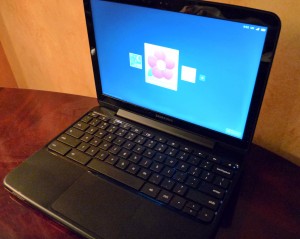Chromebooks Live!


My fellow ZDNet writer, Scott Raymond argues that the consolidation of WebKit, and Chromium open-source Web browsers source code trees means the end of a need for Chromebooks--and by extensions other lightweight laptops. Specifically, Raymond argues, "If we had the Chrome browser on an Android tablet, why would we want a Chromebook? For the price of a Chromebook you could pick up an Android tablet with a keyboard that connects via dock or Bluetooth. You would have the same functionality, plus the added capabilities of Android."
Why would I want a Chromebook? Because, while I like tablets a lot-I currently own and use a first generation iPad and a Nook Color--I also like having a single-unit, lightweight laptop.
My Samsung Chromebook, warts and all, has become my grab-and-go device. It weights next to nothing and it has a battery that can see me through an entire day of use. It also, and this is more to the point, lets me do everything I do with a tablet, and includes a built-in working keyboard. Sure, I could use a separate keyboard with my tablets, but with my Chromebook I don't need to worry with one.
Besides, the Chromebook is well on its way to being a lot more useful. After abandoning the ability to let its applications work off-line with Google Gears, Google is finally, as promised, bringing back this feature back with HTML5 compatible, off-line applications. The first will be off-line Gmail. This will be followed by off-line Google Docs and Calendar.
That's great news and it should help take care of one of my main problems with the current Chromebook operating system: The fact that Chrome OS and applications have real trouble working with local files on the solid-state drive (SSD).
Sure, I'll be able to use off-line Google applications on an Android tablet as well sometime soon. And, I might add, I'll be able to work with off-line Google apps. on iPads too. No one seems to have noticed that blending the WebKit and Chromium source trees will also bring this kind of HTML 5 off-line support to Apple's Safari Web browser as well in short order.
All that said, just because I can use a tablet like a laptop doesn't mean that I want to use a tablet as a laptop. For me, at least, tablets are still devices I use to consume information while laptops are what I use to create information.
So, I still think the Chromebook may have a bright future. That said, seriously, Google, Android and Chrome OS? You really want to support two operating systems? But, that's another matter for another day.
Related Stories:
Chromebooks are dead, they just don't know it yet
Google adds off-line mode to Gmail, Calendar, Docs apps
Google's Chrome operating system gets a much needed update